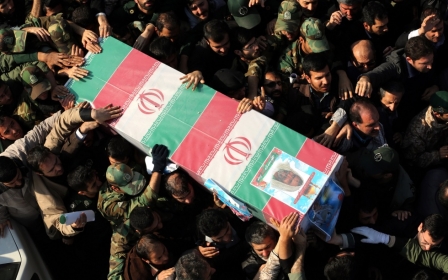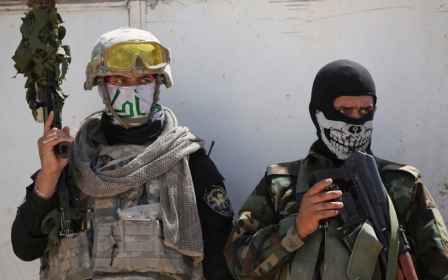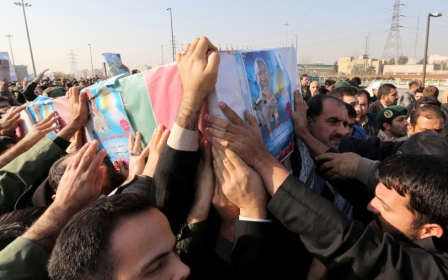Mounting casualties raise questions about Iran’s role in Iraq

The death of Iranian Brigadier General Hamid Taghavi in Iraq in late December underscores the depth of Iran’s commitment to the fight against the Islamic State group (IS).
Taghavi’s seniority and real influence (beyond his official ranking) in the Islamic Revolutionary Guards Corps (IRGC) was in full display at his funeral last Monday which was attended by thousands of Revolutionary Guards.
As the IRGC’s leading Iraq expert and one of the founders of the 9th Badr Corps, the specialised IRGC unit staffed by Iraqi defectors during the Iran-Iraq War, Taghavi’s death – at age 55 and allegedly at the hands of an ISIL sniper – is a significant tactical and psychological blow to the Revolutionary Guards (also known as Pasdaran).
This high profile casualty puts a spotlight on Iran’s leading role in the fight against ISIL. But it also calls into question Iran’s expanding role in Iraq and more broadly Iran’s strategic posture in the region.
Most important of all it raises the question as to whether Iran needs to reach an understanding with the United States if it wants to escalate its influence-building infrastructure in the region to the next level.
Syria: A spurious comparison
Supporters of the intensification of Iranian involvement in Iraq often point to Syria, where broadly similar circumstances have prompted a deep Iranian intervention on behalf of the Syrian government and the Syrian armed forces.
But comparisons with Syria are deeply flawed and misleading.
First and foremost, Syria and Iran maintain an official alliance (Iran’s only formal alliance) and deep ties that stretch back over three decades. In the early 1980s Syria was the only major Arab country to dissent from the norm by supporting non-Arab Iran in the long-running Iran-Iraq War. This unprecedented move has never been forgotten in Tehran.
By contrast, Iraq has been an enemy and deadly rival to Iran for most of recent history. Memories of the Iran-Iraq War are still very fresh in Iran, and repercussions from that epic conflict continue to influence regional dynamics and events, including the emergence of IS.
The alliance with Syria is crucial to Iran’s regional policy in so much as Syria is an avowed enemy of Israel and an unwavering supporter of Iran’s proxy in Lebanon, the Hezbollah movement. The collapse of the Syrian state would pose very serious challenges to Iranian policy in that it would remove Iran’s upper hand in the ideological and geopolitical conflict with Israel.
Again, by contrast, Iran’s interests in Iraq are nowhere near as wide-ranging. During the 1980s and 1990s Iran’s principal aim was to remove Iraq as a pressing threat, and to subsequently alter Iraq’s strategic profile from one of proximate enemy to potential friend. This objective was achieved following the overthrow of Saddam Hussein in April 2003, arguably the most striking, unintended consequence of the US-led invasion of Iraq.
Without a doubt, the rapid deterioration of security in Iraq in recent months and the near collapse of the Iraqi army necessitate a degree of Iranian intervention. IS and its allies are implacable foes of Iran; they don’t just have their sights on Baghdad, but given half the chance, they would take the fight inside Iran’s borders.
This point was eloquently made by Admiral Ali Shamkhani, head of the supreme council for national security, who told a large crowd at Taghavi’s funeral that if IRGC men don’t fight and die in places like Samarra they would have to fight and die in Tehran.
Shifting strategic posture?
In recent weeks, more and more senior Iraqi officials have openly alluded to Iran’s leading role in the pushback against IS and its allies. Most dramatically, Hadi al-Ameri, the head of the powerful Badr organisation, the successor to the IRGC’s 9th Badr Corps, and an influential Iraqi politician, is on the record as saying that absent the intervention of Major General Qasem Soleimani, the commander of the IRGC Qods force, “we would not have a government headed by [Iraqi Prime Minister] Haider al-Abadi in Baghdad”.
There appears to be an acute appreciation on the part of powerful Iraqi politicians that whole-hearted Iranian intervention on the ground, as opposed to half-hearted US-led air strikes, is the decisive factor in the existential struggle against IS.
Despite the apparent success of the Iranian intervention, Iranian strategists are faced with difficult choices and decisions in Iraq and beyond.
In Iraq, the most pressing question revolves around the timeframe of the Iranian intervention. The spurious comparison with Syria is actually useful in bringing strategic facts into sharp relief: Whilst Iran is indefinitely committed to the survival of the Syrian state, its commitment in Iraq cannot be open-ended. This is also a question of resources, as the Islamic Republic cannot afford to fight on two fronts indefinitely.
More broadly, there is the question of the strategic underpinning of intensifying Iranian interventions and influence-building operations across the region. Hitherto these efforts have been undertaken not just independently from Western powers, but in many cases, in direct defiance of American interests and actions in the region.
Contrary to what US President Barack Obama appears to believe, Iran is already a highly successful regional player. Nevertheless, Iranian strategists must think more originally about the scope and nature of Iranian policy in the region and possibly beyond.
Ultimately, Iranian interventions have so far taken the form of covert “advisory” roles, with the IRGC Qods force at the helm. For a variety of political, strategic, and ideological reasons, the IRGC and other Iranian armed forces have been reluctant to deploy avowed expeditionary forces.
If Iran wants to be recognised as more than a just a regional player, then its armed forces will need to accept greater international responsibility and crucially submit to commitments which have the blessing of the international community. It remains to be seen if Iran can achieve this outcome without coming to terms with the United States.
Mahan Abedin is an analyst of Iranian politics. He is the director of the research group Dysart Consulting.
The views expressed in this article belong to the author and do not necessarily reflect the editorial policy of Middle East Eye.
Photo: Iranians carry the coffin of Brigadier General Hamid Taghavi, a commander of the Revolutionary Guards reportedly killed in Iraq, during his funeral in Tehran on 29 December 2014 (AFP)
New MEE newsletter: Jerusalem Dispatch
Sign up to get the latest insights and analysis on Israel-Palestine, alongside Turkey Unpacked and other MEE newsletters
Middle East Eye delivers independent and unrivalled coverage and analysis of the Middle East, North Africa and beyond. To learn more about republishing this content and the associated fees, please fill out this form. More about MEE can be found here.





